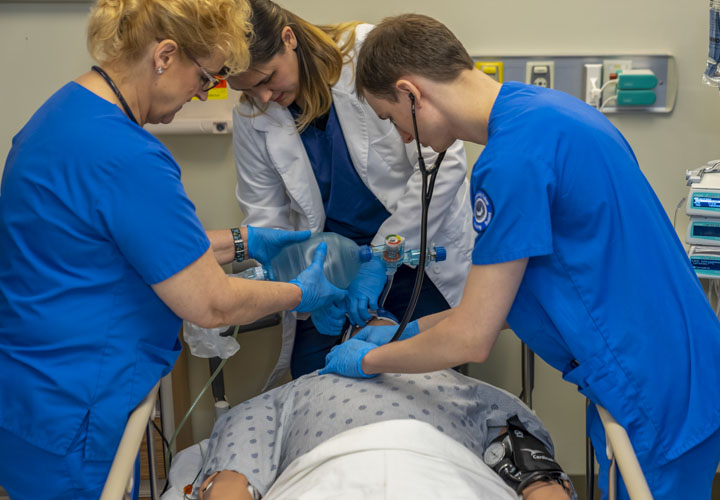Turn Compassion into a Rewarding Career
Do you enjoy helping others? Are you thinking about a career in nursing but not sure if a full college degree is right for you? Our Licensed Practical Nurse (LPN) certificate program is a quick, cost-effective way to jump into health care and start making a difference.
As an LPN, you play a vital role in patient care - providing comfort, support and essential health care services. It’s a role that blends heart and skill, offering job stability, flexible scheduling and growth opportunities.
For a look at the courses in our program, consult the course list.

From Classroom to Clinic – Fast
In about a year, you’ll have the clinical and patient care skills you need for employment.
Our faculty of nurses and nurse practitioners bring real-world experience to the classroom. You’ll learn:
- Nursing fundamentals
- Essential clinical skills
- And more
LPNs are in high demand, offering job stability and a wide range of opportunities.
And, if you decide to keep going with your education, earning your LPN is a smart first step toward becoming a Registered Nurse.
Ready to get started?
For more information on our program, contact Teri Hupfel in our Nursing Department at 586.286.2074.
Long-term care facilities and hospitals need you
With increasing demand for skilled professionals, a career as an LPN offers abundant job opportunities and competitive salaries. Ready to see for yourself? Check out the data we’ve pulled together.
If you haven’t already been recruited by a hospital when you’re ready to graduate with your associate degree, our Career Services team can help you with the job search and interview preparation, including preparing your resume.
Additional Information
Programs in Health and Human Services require specific criteria to gain admission, such as testing requirements or minimum grade point average in prerequisite courses. Please view the Selective Admissions program application packet for information on application requirements, ranking and deadlines.
For information on how to apply to a Selective Admissions program, please email us at selectiveadmissions@macomb.edu. Selective Admissions applicants are encouraged to meet with an academic advisor or counselor prior to submitting an application to the program. This meeting will allow for review of the application process, program prerequisites and requirements. Contact the Counseling and Academic Advising Office at 586.445.7999 for office hours.
The goal of the Health and Public Services Division is to prepare every student to think critically and practice competently and compassionately in rapidly changing environments. All efforts are designed to build knowledge, enhance practical skills, and promote patient and the population’s safety. Furthermore, the program is designed to foster professional integrity and ultimately improve the health outcomes and protection of patients, families, and communities across the continuum of care and practice. Students must possess certain functional abilities, essential for the delivery of safe, effective clinical care and protection of the public during clinical and internship training activities in the field. Therefore, the faculty has determined that certain technical standards are required for admission to, progression in, and graduation from the Health and Public Services (HPS) programs.
In addition to classroom learning, clinical and internship learning occurs throughout the HPS programs and involves considerations (such as patient and population safety and clinical and internship facility safety) that are not present in classroom accommodations. Applicants or students interested in HPS programs who seek accommodations prior to or immediately after enrolling in the college are highly encouraged to also request an assessment of the types of reasonable accommodations needed for the clinical and or internship components of the program.
An individual must be able to independently, with or without reasonable accommodation, meet the following technical standards of general abilities: (1) observation; (2) communication; (3) motor skills; (4) intellectual, conceptual, and quantitative abilities; (5) essential behavioral and social attributes; and (6) ability to manage stressful situations. Individuals unable to meet these technical standards, with or without reasonable accommodation will not be able to complete the programs and are counseled to pursue alternative careers.
SPECIAL SERVICES STATEMENT: Students may individually discuss the essential functions and technical standards with a college counselor from our Special Services department. In compliance with Section 504 of the Rehabilitation Act of 1973 and the American Disability Act of 1991, academic accommodations may be provided to students who have a documented disability.
For further information, visit Special Services.


